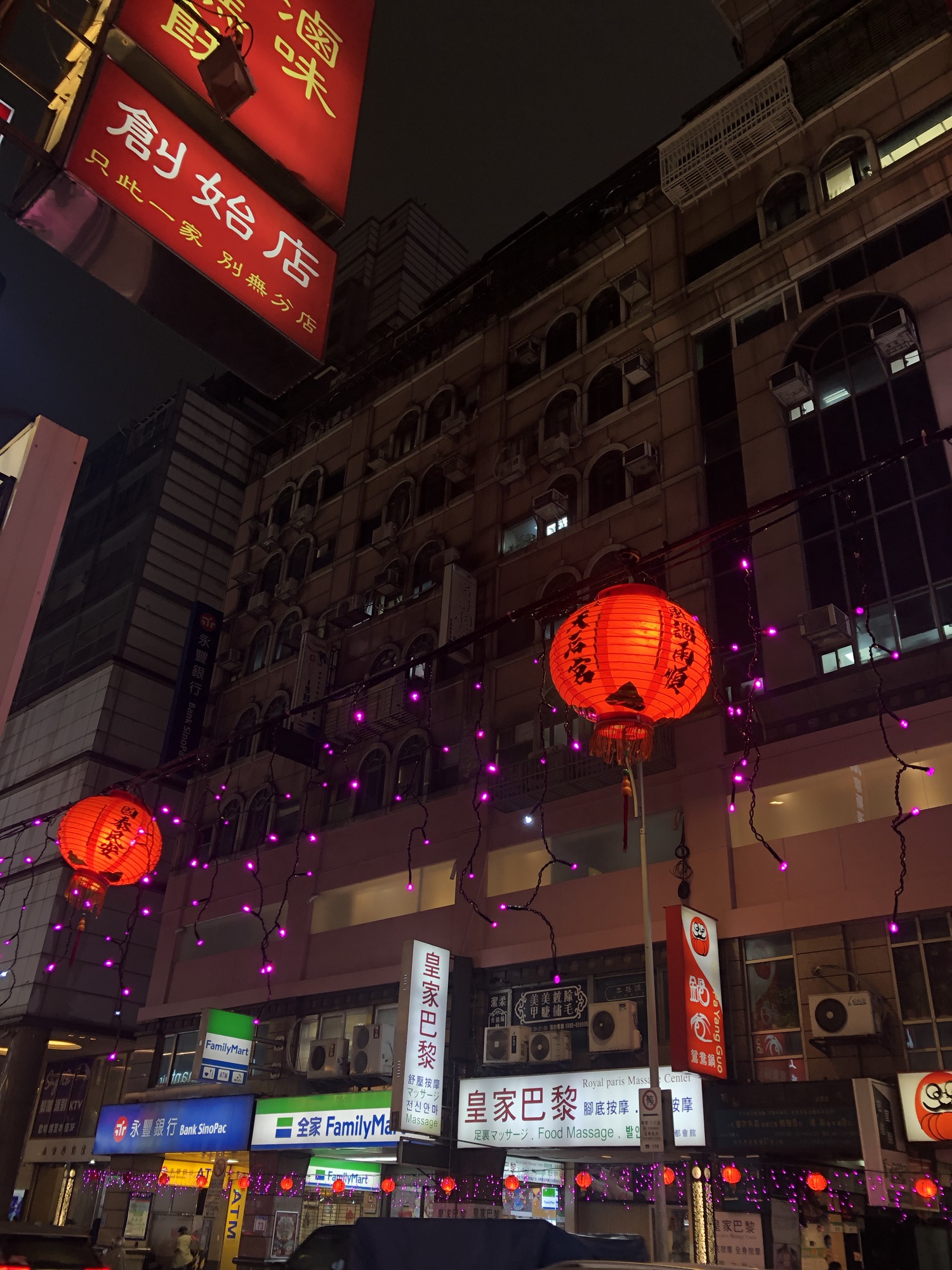I keep turning over new leaves, and spoiling them, as I used to spoil my copybooks; and I make so many beginnings there never will be an end.
Louisa May Alcott, “Little Women”
A new chapter!
In which I…
- Land in Taiwan and discover a myriad of cultural differences
- Begin volunteering at a hostel
- Learn about Taiwanese history and tribes at a museum
- Learn about Taiwanese queers and drug addicts at a nightclub
- Ascend to gay heaven
- Party so hard that I fall sick
Table of Contents
25 January 2024
- 8:30-12:50 (->11:50) Narita airport to Taoyuan airport flight
- 13:55-15:40 Taoyuan airport to Ximen station bus number 1961
- Tianhou Temple (15m)
Japan’s Narita Airport
I slept three or four hours inside Tokyo’s Narita Airport and ate the most delicious, plastic-y noodles okonomiyaki at Lawson for breakfast at 5:00. Had convenience stores in Japan improved whilst I was cooking, or did everything taste good when it was your last time eating it?
International departures from terminal 3, reserved for low-cost carriers, were so infrequent at this time of the day, that I waited for an hour for the security check to open. I watched the sunrise from the gate and enjoyed ample leg room in a vacant emergency exit row inside the plane. Once we took off, I lay down on three seats. First class realness.
I didn’t cry this time around. My departure from Japan would in all likelihood be temporary, and more good days there would come. Moreover, I felt that the time to visit Taiwan was now.
After sleeping for two hours, I noticed the sky was an ocean of white. Clouds stretched all over, leaving no opening for a peek of sea. Like an endless layer of whipped cream.
Then the cream began to rise, as if forming a range of mountains, until it took over my view like steam. We were inside the clouds.
All the passengers in my flight were quiet.



Taiwan’s Taoyuan Airport
I landed in Taiwan’s overcast Taoyuan Airport. The faces around me changed, just like the day I’d landed in Korea. I could easily tell apart Japanese and Koreans, but Chinese and Taiwanese, only half the time.
I arrived in Taiwan on the coldest week of the year.
At the tiny 7/11, I saw at least one thousand products I wanted to try. Onigiri in outlandish flavours! Enticing sandwiches! So many meatless options.
This wasn’t Korea. There was even a wide selection of fresh oden. I bought a truffle spinach and egg burger; a seafood toast; and an EasyCard (the local transportation card). All tasty, including the card.
The beeping inside the store differed from those in Japan. It sounded a bit like a creepy, 8-bit video game.
None of the shops in the airport sold a data-only, 90-day SIM card. So I took the bus to Taipei.
“Ximending?” the driver asked me.
「はい」I answered in Japanese. 《 네 》I blurted, resorting for some reason to Korean. “Yes.”
It was a double decker. The bottom floor was for the driver and suitcases. The upper featured spacious seats that were equipped with cup holders, a USB port, and a small tray.


There was a strong chance that I’d like this country.
Taipei
I arrived at Ximen. My first sense that was activated was hearing.
Streets in Japanese cities were basically parking lots for bicycles. Streets in Taiwanese cities were basically parking lots for motorcycles. The traffic here was much louder, with rowdy motorcyclists of all ages and genders. Walking space on sidewalks was cut in half because of all the parked motorcycles.
A sign that I’d gotten closer to Southeast Asia.
Ximen was also known as the Shinjuku of Taiwan. Street art, fashion stores, youthful vibe. Also the gay capital of Taiwan, full of rainbow decorations. My hostel was less than a minutes’ walk from the queer nightlife scene. In front of it was a post office and a huge 7/11 that was kawaii themed.
There was a very strong chance that I’d enjoy my time in this country.



I’d never seen a themed convenience store before. How come Harajuku didn’t sport the same kawaii-ness?
The hostel seemed both dirty and stylish. Old, concrete floor; new, wooden tables; dark grey walls. Some of the staff spoke English. They offered me rice and hot pot for a late lunch. The latter included balls filled with a gooey, yellow substance. According the the staff, it was cheese.
The kitchen was too tiny to cook in. Neither plates nor glasses. Neither knives nor spoons. Just a few old bowls, chopsticks, and forks. It was impossible to sift through these, overflowing inside the drying rack. There was no cabinet or shelf to move them to.
Moreover, signs inside restrooms forbade flushing toilet paper. I assumed it was a translation error. Tossing used toilet paper to a trash can? Was this Southeast Asia?



Tianhou Temple
I walked to three mobile providers nearby, passing gaudy shops selling red and gold paper lanterns. None sold an affordable, limited-data SIM card.
So I checked out the adjacent Tianhou Temple. As expected of a Chinese-style place of worship, it was lavishly red and golden, brimming with decorations.
I met an 18-year-old Dutch guy who’d landed a few hours ago from China, after studying the language there. We talked at length about the differences between far eastern countries. Our conversation was more engrossing than the temple.


Back in the hostel, I met the other volunteers: a girl from Singapore, a guy from Bristol (why was almost every single British person I’d been meeting on this trip from the Bristol area? Barely any Londoners or northerners!), and two American guys.
Never thought I’d see the latter two nationalities volunteering at a hostel.
As we chatted on the lobby’s couches, a buzzing made me jump. A mosquito electrocuted itself on a bug zapper by my feet. Even in gloomy January, there were mosquitos here.
I ate some strawberry jam toast for dinner, complimentary for the staff, and went to bed at 23:00. I’d been grinning since glimpsing this island from inside the plane this morning.
Today’s highlights: noodles okonomiyaki; flying through clouds; landing at a new country.
Stray observations:
- Taipei seems less formal than Japan. Lively, messy, street vibe. Tons of vendors selling cheap clothes and produce on sidewalks. Not to mention all the motorcycles.
- Public Wi-Fi doesn’t require you to sign up. Thank god.
- Store employees greet customers with 「你好!」
- Pedestrian lights include a countdown.
- WHERE ARE THE WASHLETS? WHERE ARE THEY?
- Like Koreans, Taiwanese guys are taller than Japanese.
- Like Korea, tableware in Taiwan is made of metal.
- ATM fees are 100$. Double than Japan.
- Seriously though, am I supposed to go back to using toilet paper like a NEANDERTHAL?
- Even red traffic lights have a countdown. So convenient.
- Am I really, truly, wholeheartedly expected to go from advanced washlets with heated seats to wiping with toilet paper and then throwing it to a trash can that would stink up the entire restroom?!
- Toto, I don’t think we’re in Kansas anymore.
26 January 2024
- 11:00-12:30 shift
- National Taiwan Museum (1.5h) + 228 Peace Park
- Street food @ Ximen
- Bar @ Red House
- Techno club @ Ximen
First Shift at the Hostel
First day of volunteering. Officially, shifts lasted between 11:00-15:00. In actuality, they ended before that. It was the low season.
I grabbed breakfast from 7/11. A triple cheese sandwich and a pair of giant, deluxe seafood sushi. As I bit into one of the latter, I discovered ham inside. Korea war flashbacks.
Then, my first shift. Every morning, each volunteer got a piece of paper with their tasks for the day. With four floors, this usually meant a floor for each. Unlike my previous volunteering gigs, this one was for lone wolves: no teamwork was involved in the shifts.
Bummer. The whole point was to befriend the volunteers and bond over dirty sheets. Each volunteer took a cart with cleaning supplies, put on headphones, and went to their floor.
Yet today, at least, the American-Brazilian volunteer taught me how to clean. We washed used slippers in the shower and let them dry while making the beds (only three on our floor today). The duvets were two meters long: a nightmare to change alone.
We scrubbed the showers using a cleaning product so strong, that we put on masks. The shower looked pretty, made of stone walls, yet the floor was unpleasantly bumpy. Moreover, the water temperature fluctuated without notice.
Next, we wiped the toilets, without cleaning the inside of the bowl.
“This hostel is always clean,” he said.
Indeed, it was quite restrained. The biggest source of noise was an old Taiwanese volunteer whose status as a staff member was a mystery. He didn’t do much, apart from using his phone and watching me like a hawk.
The shift continued with sweeping and mopping. Midway through, a Japanese couple checked in. I found myself bowing for the first time in 24 hours.
Finally, we emptied trash cans by picking the garbage using tongs and transferring them to a bag. This included used toilet paper from the toilets.
National Taiwan Museum
To take advantage of the early finish time, I visited the National Taiwan Museum. It was the oldest museum in Taiwan; it closed earlier than all the others; and it was a fifteen minute walk, straight all the way. I didn’t want to ride public transportation without a SIM card.
Taiwan was 15 degrees and cloudy, so a museum made sense. Particularly one that would educate me about this country.
I passed buildings with baroque and art deco façades, such as the heavily-guarded presidential office. The museum stood inside the 228 Peace Memorial Park, for victims of a massacre on 28 February 1947. There was a large monument with a waterfall, as well as Chinese pavilions.






The building erected by the Japanese was completely western in style, reminiscent of the Fitzwilliam Museum in Cambridge.
The first floor housed temporary exhibitions. I learned that Taiwan’s location at the intersection of Northwest and Southeast Asia, in conjugation with its varied terrain (plains, mountains, wetlands), had turned it into an important rest stop or destination for migratory birds.
I also learned about the Rukai tribe, who valued blood kinship and ancestral spirits. This gendered society delegated weaving to women and the erection of a weaving house for men. Once the women’s studio was built, it was taboo for a man to enter it.
Rukai men were taught to be brave. They exercised to achieve thick legs and a narrow waist. The traditional (and gorgeous) long-sleeved shirt and short skirt highlighted this ideal physique. Rukai men made their own hunting tools, and performed a blessing ceremony to unite their destiny with the divine power bestowed by the gods upon their outfits.
I’d come to this museum wanting to learn about the history and indigenous people of Taiwan. Thus, I found it fascinating how such a tribe gave meaning even to the pillars inside their house, always six in total, because they bore the burden of support and transmitted blessings of the creator Twaumas.
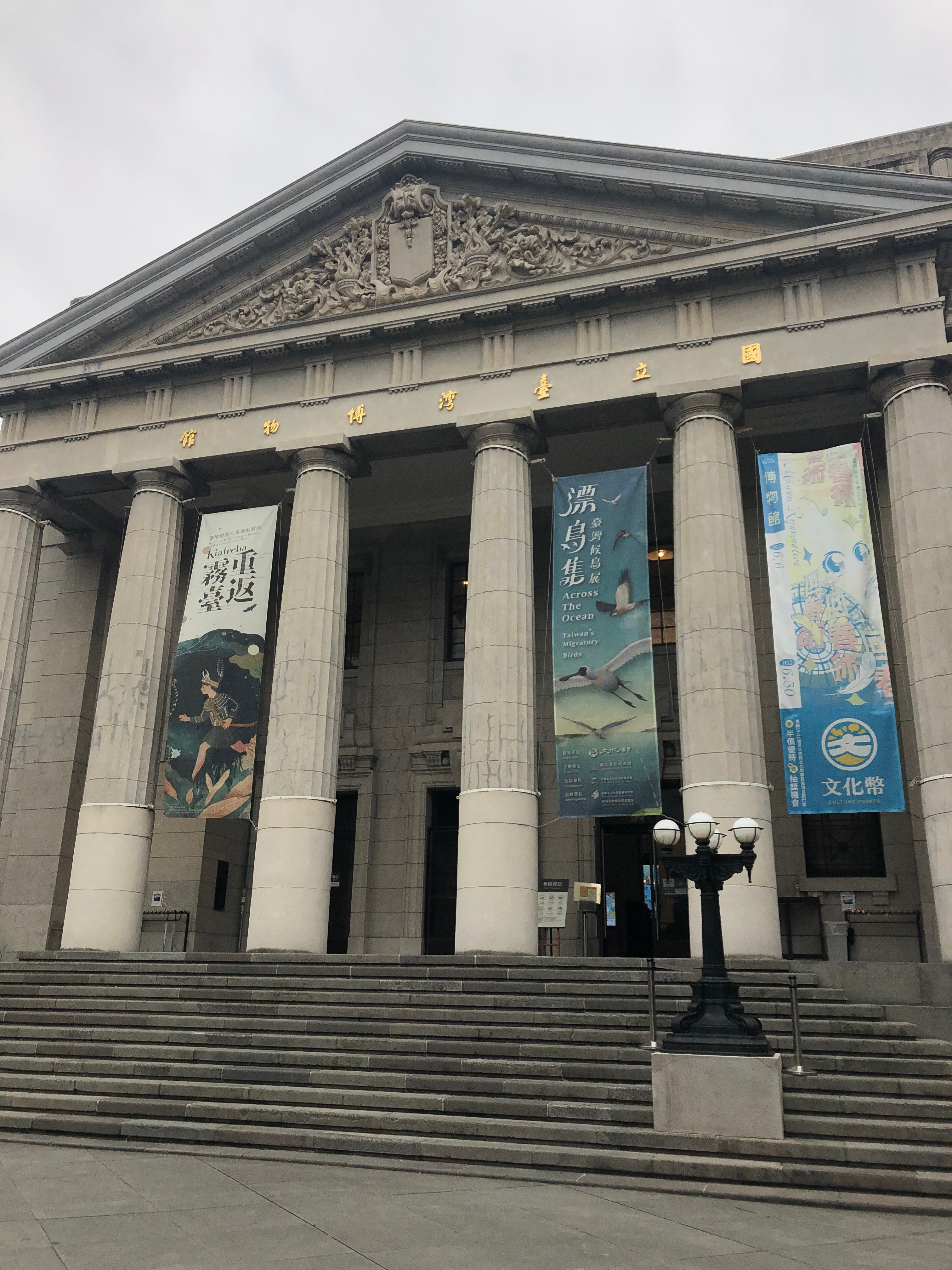



The permanent collection of the second floor gave me a history lesson.
- Taiwan chronicle woodblocks (1695): the earliest history book in Taiwan, and first woodblock printing. Ancient, extremely complex, barely legible Chinese characters.
- Kangxi Taiwan map (1699-1704): the oldest Chinese landscape style map of Taiwan, for military reasons.
- The genre paintings of Taiwan aboriginal peoples / Hsu Shu (1820): a Han person’s stereotypical impression the Pingpu group in western Taiwan, during the early Qing dynasty. It reminded me of nihonga.
- Sinkang manuscripts from Sinkang village: a shopping list of groceries and prices. In the 17th century, Dutch missionaries had taught the Pingpu how to write their own language. Like in Mesopotamia, writing was invented for administrative and capitalistic reasons.
- Portrait of Koxinga: the earliest portrait of the first Chinese ruler in Taiwan, who had defeated the Dutch army in 1662.
- The Butan Incident: in May 1874, Japan had claimed that a group of Japanese fishermen had been killed by the Taiwanese. They’d sent an army. The Qing Dynasty had paid for Japan’s military expenses, and Japan retreated in return.
- The yellow tiger flag of the Republic of Formosa: on 2 June 1895, the Sino-Japanese war ended with the Qing administration ceding Taiwan to Japan. Taiwan had established a republic in response.
- In 1900, women’s foot binding was outlawed.
- A reconstruction of the main building of a Ravar group’s family home, from the Paiwan tribe, included an ancestral spirit pillar with a tomb and a place to store umbilical cords.
- In the 1980’s, gamblers who had lost the underground lottery scene forsaken statues of the deities who had failed them outside Lungshan temple. The temple had accepted those homeless deity statues over the years, and now presented some inside the museum.
On my way out, to my delight, I came across marimo from Lake Akan. The first director of National Taiwan Museum was also the one to discover them.
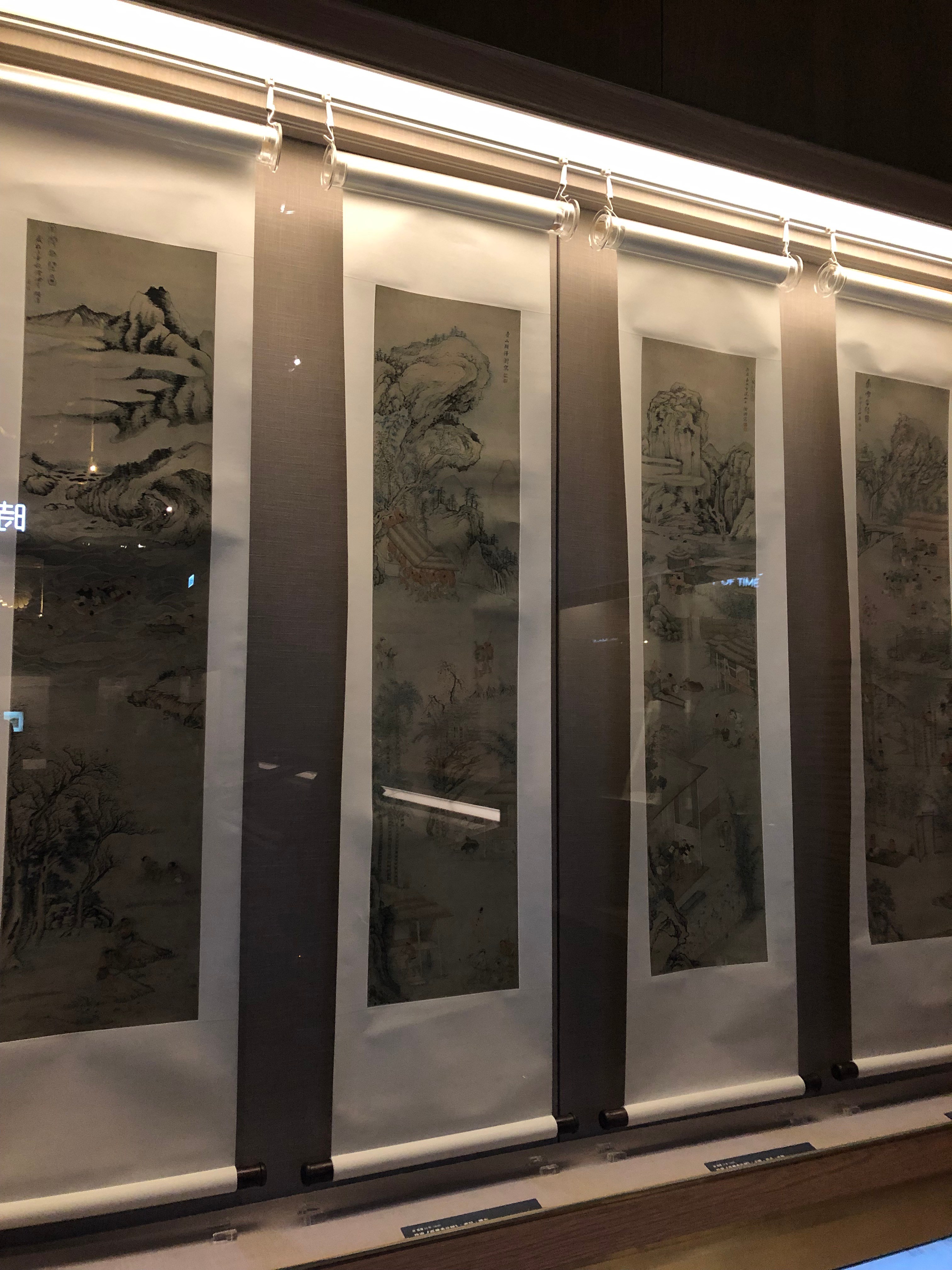


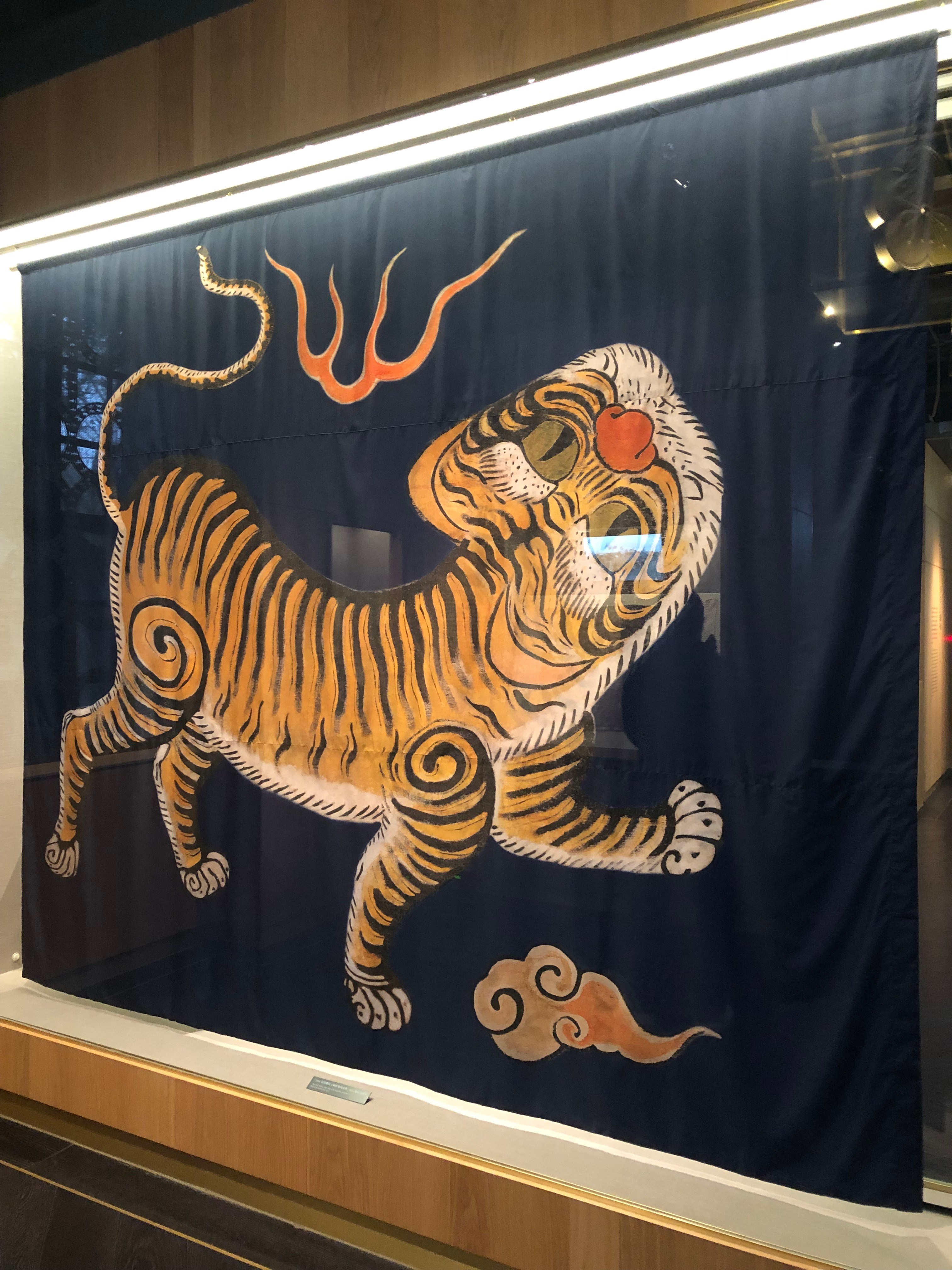

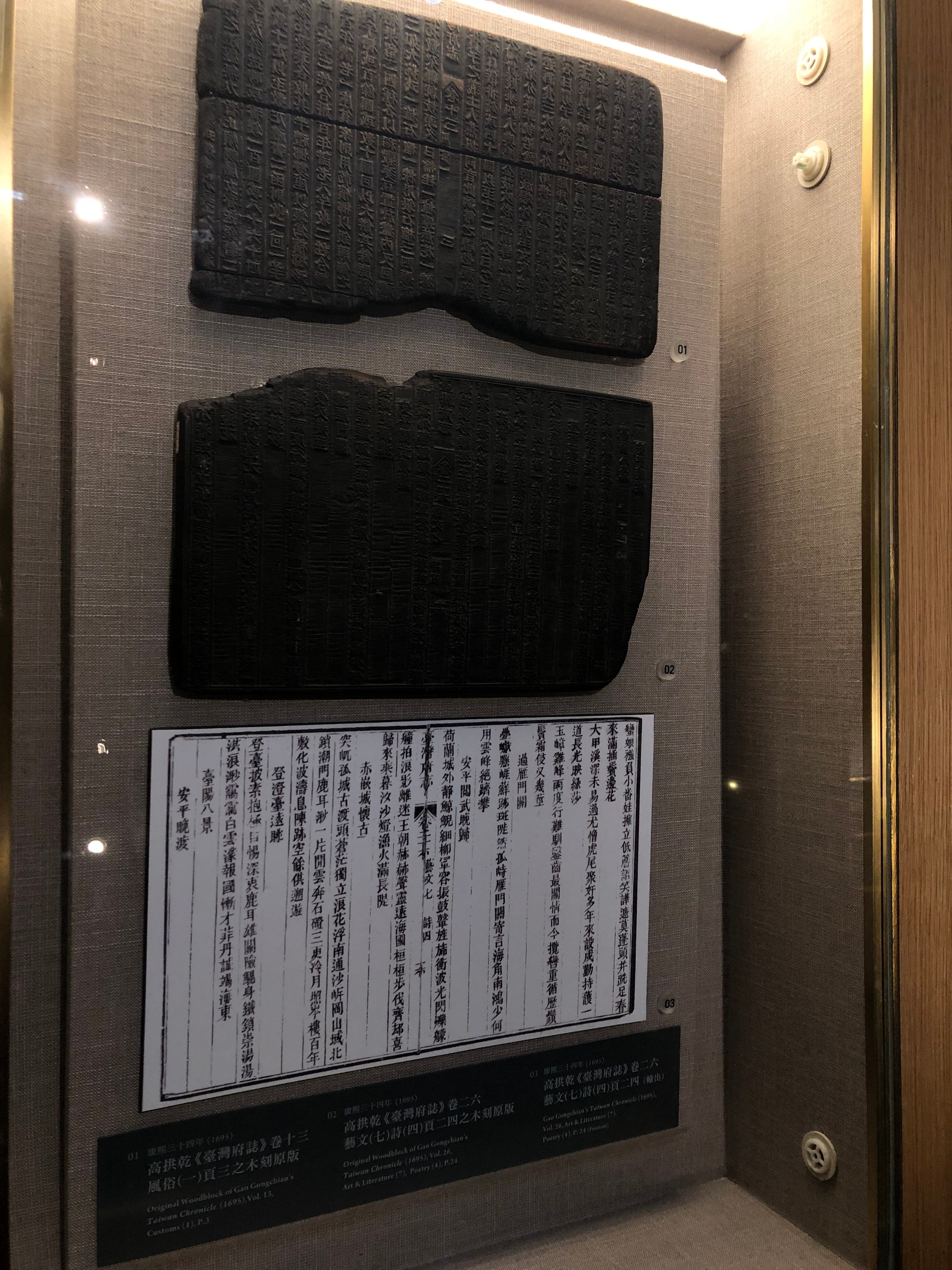
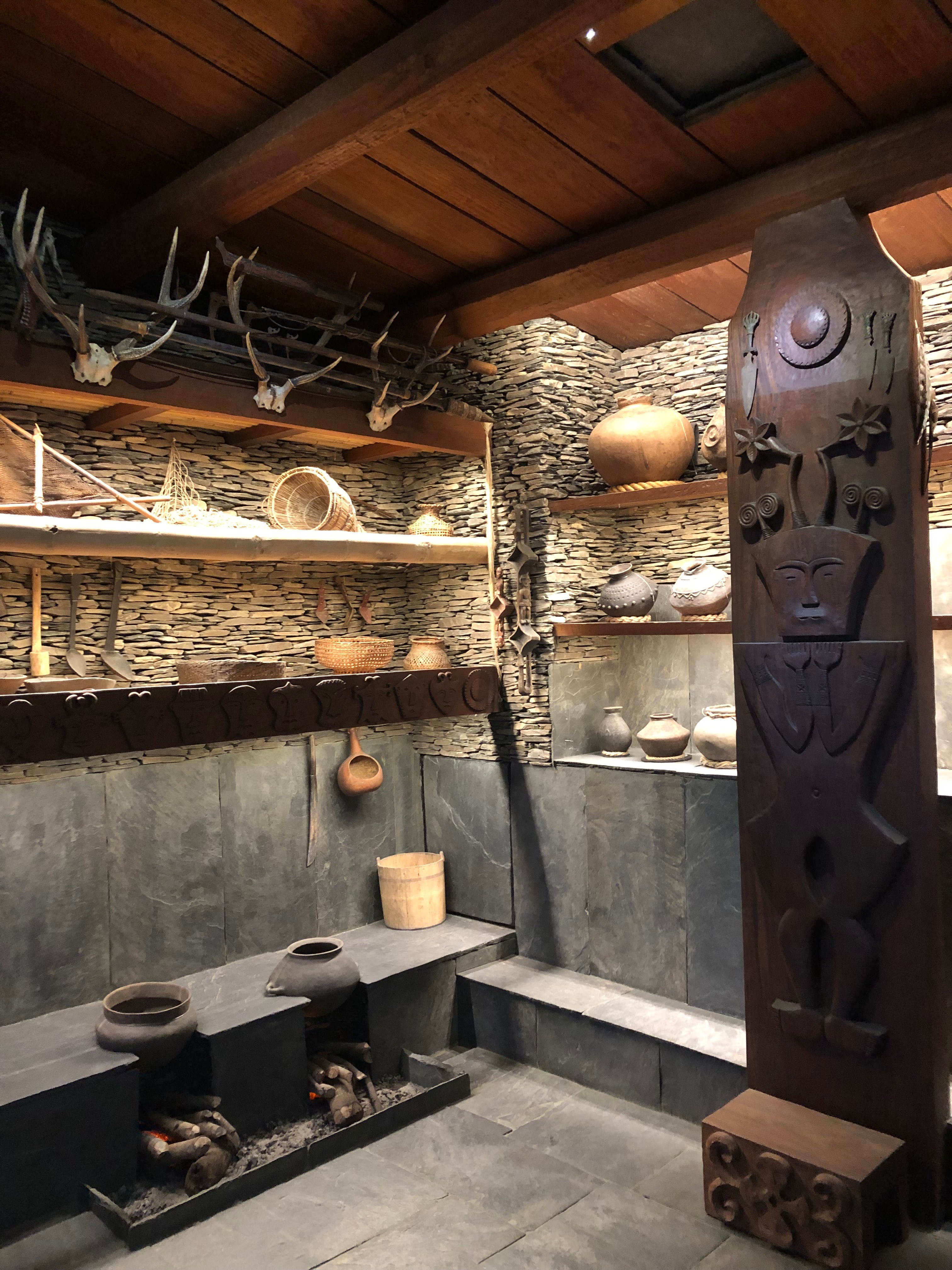

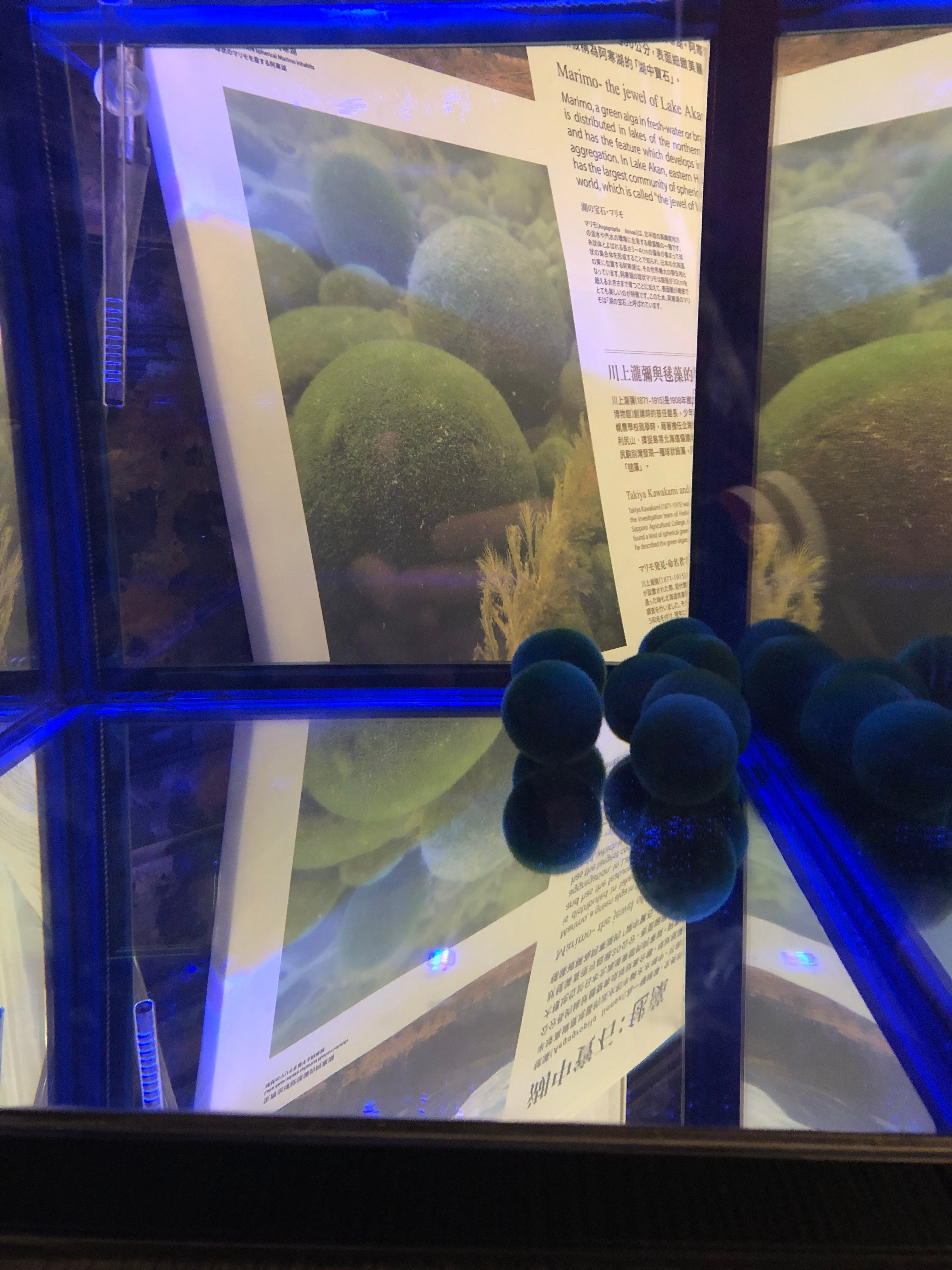
Tickets to the NTM included entry to the adjacent natural history museum, which didn’t speak to me. So I strolled around the park. There, a grandpa was clapping so incessantly and loudly, that it seemed like he was walking around just so that everyone could hear.
Never in Japan. Perhaps in Korea.
I walked back to Ximen. A bright, colorful, bustling shopping and dining center, it reminded me of Seoul’s Myeongdeong. A serving of piping-hot oyster noodles gave me my first peek into why Taiwan was considered to have the best street food in the world. People were eating it while standing in the middle of the road.
Never in Japan. Perhaps in Korea.
I found Japanese imports at Donki; the natto, like in Korea, cost thrice as much. A travesty.
Instead, I ate a fried potato filled with cheese, egg, corn, spinach, and pineapple, all swimming in an orange sauce.



Back in the hostel, I rested in the evening with the volunteers, before going out. My sleepless night at the airport had worn me out.
My desire was to attend a drag show at a club one minute from the hostel. My last drag show was in Seoul’s Itaewon in late July. After two months in Kyoto and the Japanese countryside, I wanted a club packed with people. I wanted deafening dance music, crazy performances, and no space to even stand in comfort. Yet the volunteers were going to a techno club on the other side of town.
I couldn’t do it. I had not missed it. That feeling of being the odd one out […] It was a painful reminder of heteronormativity. I wanted to talk to Alejandro, but he was off duty. Busan had also featured only one other queer person in the bunch […] All the volunteers, and some regulars they’d befriended, wanted to go clubbing. I wanted to party with them – yet couldn’t go out to a straight venue again. Not another Seomyeon.
We stood outside the café’s building in busy Takadanobaba, on a cold night, and continued in different directions. Fifteen of them walked together to the station to catch the train to Shibuya, while I walked alone for 35 minutes to ni-chome.
I felt lame for ditching them. But I also felt lonely and misunderstood. Different. No one had wanted to come with me to ni-chome.
“Back to Square One” (10 November 2023)
I recalled this moment as I wondered: do I ditch the volunteers and act anti-social, or choose them over the potential of romance?
The kind of decision only a queer person ought to make.
A Wild Night of Partying in Ximen
I went to the Red House, one of Taipei’s queer areas. A bustling spot for bars, where people gathered for pre-party drinks. It was a 30-second walk from my hostel.



At 22:45, I met Chill, a 31-year-old guy sitting with his friends at the most popular bar.
“Are you French?” his friend asked before anyone could say anything.
“Wesh,” I said.
Chill was skinny and smartly dressed, with cropped hair and elongated features. His face was sharp yet kind. He had a Chinese accent and an unhurried manner of speaking.
His friend was easy on the eyes – and he knew it. He had an impressive bone structure and a Japanese-like hair parted in the middle. From my uncultured, green perspective, nothing about him resembled Taiwan.
A third friend was a Danish girl who’d been living in Taipei for the past six months. Her blonde hair was parted into a tight bun.
The group around the table was ten or so, but this trio became my company for the night. I disliked the chain smoking around me at the bar, but enjoyed the beach-y décor, full of plants. The rainbow-colored urinals featured SpongeBob and Patrick curtains. There was not one vacant seat tonight.
“What is Taiwan’s alcoholic specialty?” I asked while sipping red wine. I only knew Japan’s sake and Korea’s soju.
“They don’t serve it here,” Chill said. “It’s better to drink it at a high-quality place.”
As the conversation (and alcohol) flowed, it struck me just how laid-back and carefree the atmosphere at the bar felt. For a queer space, it seemed remarkably non-strict and normal. Holding hands was totally okay; even going beyond that. Guys were browsing dating apps and showing each other their chats.
I’d never gone out with such a large group of queer individuals, nor seen friends do that. Openly discussing sexual partners and dirty details. This was the only Asian country where gay marriage was legal, and after months in Japan and Korea – let alone an entire life in Israel – I kept saying out loud how free and loose everything felt.
Had I taken a plane up to gay heaven?
At 23:45, Chill walked me to the drag club. The price they asked for, even though it included two drinks, was four times what I’d used to pay in Japan and Korea.
Since I’d already missed the first show, I returned with Chill to the Red House. The trio was going to a techno club also one minute from here. They’d already paid for a cheap, early entry. I paid more just to join them.
We walked around Ximen, as lively as ever at midnight. Vendors were selling street food on carts.
“The carts have wheels in case they need to run,” Chill said. “Sometimes the police does raids. They don’t have a license.”
An old woman was standing in the middle of the road, chanting a Buddhist sutra.
“Oh, I love her!” the trio exclaimed. “She’s famous. Everyone in Taipei has seen her.”
She seemed to need neither a microphone nor oxygen.
“She just goes all over and spreads the word. That’s all she does.”
We grabbed Strong Zero from 7/11 and sat on the stairs outside the skyscraper in front of Ximen station’s exit 6, with the rainbow-colored pedestrian crossing. The techno club was on the roof of this building, yet tonight was a slow night. Last week, this straight venue had thrown a queer party, so busy that one could not even move.
“It’s so boring,” Chill’s friend groaned, “everything in Taiwan is boring.” He’d studied French for a year in Nice.
Still, judging by their stories, there was a lot of drama to unpack, as well as drug use.
“Do you want to be part of the drama,” the friend asked, “or just hear the drama?”
I thought for a moment.
“Both.”
He was in a bad mood, after a recent fight with his guy. As I listened to his story, it occurred to me how uninhibited he was. He spoke directly and honestly (perhaps brutally so), going as far as asking me questions no Asian had right after meeting me. Japanese people were his antithesis.
At some point, he and the girl went up to the club, while I stayed on the stairs with Chill. The latter taught me signs that indicated drug addicts in the community. Drug use was so prevalent here, that some foreigners who’d come with a clean slate to Taiwan had become addicts, and even contracted HIV.
Again, the complete opposite of Japan.
We held hands and arms around our shoulders while discussing the dark side of Taipei. I was learning a lot today.
Suddenly, a powerful chanting quelled our conversation. The Buddhist grandma was cycling toward the station while continuing her sutra. She possessed the vocal cords of an opera singer.
At 2:00, we went up to the club. I felt exhausted and tipsy, before the dancing even began.
Being on the ninth and highest floor, the club was singular in featuring both an indoor dance floor and an outdoor rooftop lounge. Shivering uncontrollably on one of the coldest nights of the year, we sprawled on a couple of couches and talked about life.
The Danish girl was leaving Taiwan in three days. She was so sad, that she planned to settle here in the future. Just like me and Japan.
The guys were showing each other dirty videos of themselves while reclining together in an affectionate way.
“They’re very, very good friends,” the girl remarked.
I believed her. The situation seemed nothing more than platonic. In looser Taipei, even friends seemed to be able to act like them.
As witching hour darkened, the couches filled up. I sat on Chill while his friend lay his head on me. Cuddling platonically, we discussed drugs again. Half of the crowd was comprised of users and dealers.
“I’m learning so much today,” I said.
The plants and walls on the rooftop lounge were lit neon green, while the sky above us was purple and foggy.



I couldn’t fathom how drastically my circumstances had changed. From straw tatami and obaachans to neon pollution and substance abuse. I recounted my last week to the girl while the guy was showing us nude photos. What was this sex-positive land of amity? I found this friend group both refreshing and enviable.
“If a girl is very tight down there,” she said soon after, “it can rip a cord on the guy’s foreskin. He will need a circumcision surgery.”
I burst out laughing. A few days ago, I was volunteering at a temple on an obscure mountain most Japanese people hadn’t heard of, cleaning, stargazing, and napping in the afternoon, for lack of a better thing to do. Now, I was at a rooftop techno club in a metropolis, engulfed by neon plants, cigarette smoke, and a lavender haze, talking about a torn foreskin due to tight penetration.
I laughed so much, that I was in hysterics. Life!
Everything about this scene felt so funny and intimate, but at the same time, not a big deal whatsoever.
At 3:30, we entered the dance hall. People weren’t doing a very good job at hiding the fact that they’d just sniffed something.
“I love straight guys,” the guy said. “Everyone’s just here to have fun. There’s no competition, no pressure. Gays just want one thing.”
He wasn’t wrong. Gay clubs felt like sexual Olympics. A competition to be the hottest, the tallest, the most muscular and masculine.
Interestingly enough, the guy had been spending the entire night looking after the same thing. If a guy as pretty as him went through such troubles, perhaps no one was immune. This community could be both liberating and oppressing.
We danced for 45 minutes. The techno music sounded quite repetitive.
When I closed my eyes, it hit the spot. I felt like I was floating in another realm, both urban and ethereal. An underground cavern with zero gravity.
“That’s what techno does to you,” the girl said in my ear. “That’s why people wear sunglasses.”
“I thought they were doing that for another reason,” I said. She and the guy were both wearing sunglasses.
“Well, maybe some of them.”
Soon enough, with my fatigue and 11:00 shift, Chill walked me to the hostel. I noticed the British volunteer inside the club on my way out.
At 5:00, outside my hostel, he kept saying goodnight. Yet I couldn’t let him go.
Finding that click, partying beyond my body’s limit, being pinned against a pillar – today was worth going three or four times over my daily budget. I fell asleep at 5:30.
Today’s highlights: National Taiwan Museum; oyster noodles; cheese stuffed potato; the Red House; the lavender haze; clubbing with a refreshingly transparent friend group.
Stray observations:
- Ximen has a lot of homeless people.
- It is acceptable to eat while walking.
- There are public trash cans everywhere.
- This also means trash everywhere.
- The main convenience store chains in Taiwan are 7/11 and Family Mart.
- The prevalence of convenience stores in Taipei is higher than in Tokyo and Seoul.
- Taiwanese wear masks as much as Japanese do, which is more than Koreans.
- Taiwan might be the most myopic Asian country.
- When was the last time I compiled a “stray observations” section in a post? August. Finally, I was exploring someplace new.
- I do feel bad, though, being unable to communicate with most locals. I don’t want Taiwan to be Korea 2.0.
27 January 2024
- 11:00-13:00 shift
- Bar @ Red House
- Drag club @ Ximen
I woke at 10:00 like a zombie, devoured toast with jam, and got to work. Usually, each volunteer got a fair share of each task. Today, however, I was assigned all the beds, while the others cleaned the showers, floors, and toilets.
For two hours, I changed 15 beds. The duvets were a nightmare. I switched tactics and did them while sitting on an upper bunk bed ladder. They were so long, that they still reached the floor. It took forever, and gave my arms a decent workout.
After ten beds, one of the volunteers showed me a better technique for changing the duvets. I finished at 13:00.
After my shift, I went looking for a SIM card again. I’d resolved to empty my pocket on an unlimited plan, yet the stores from yesterday were now sold out.
With only four hours of sleep, I returned to the hostel in attempt to nap. I lay in bed for hours, to no avail.
In the evening, I tried some onigiri from 7/11. Two Israelis checked in, a guy and a girl. I recognized their nationality before they even started talking.
That Time I Made Out with a Go-Go Boy in a Club on a Wet Stage
At 21:00, I returned to the drag club from last night soon after it opened. Adamant to secure a cheaper entry ticket, I begrudgingly paid the fixed, steep price, just as adamant to experience what I’d missed last night.
Then I returned to the popular Red House bar, where I met Walt, a 27-year-old nurse with cropped hair, adult braces, and a well-proportioned face. A minute after we found a table, he spouted the full account of his recent situationship. I’d thought yesterday was dramatic, but tonight managed to add onto it.
What was this country.

I listened while we sipped sangria. We discussed good and bad aspects of Taiwan. At 22:45, we went to the drag club.
It locker-room-themed, with showers as booths (and underwear hanging on shower heads above the seats). Funny drinks with outlandish names and flavours, such as “Golden Shower”, “Powerbottom”, and “Adios Motherfucker” (deadly strong). I got a “PE Teacher” – rum, black tea, caramel tiger liquor, and pineapple.
The show hadn’t begun, and still, I already knew that if it weren’t for the entry ticket, I would’ve come here again and again.
Both the Red House bars and this club weren’t suited for mingling, though. It was a locals’ spot, full of Taiwanese people. And as I’d learned time after time, Asians didn’t go out alone.
The first show started with burlesque by trans drag queens. The stage was an elevated shower platform in the middle of the hall. A gogo boy invited an audience member to get wet (and dirty).
During the break, I got a “Slutty Bitch” – gin, melon liquor, elderflower syrup, and miso egg white. I wobbled back to the stage, my body weak with more alcohol than slumber. The second gogo boy invited me to come up to the stage.
Before I knew it, I was taking off my jacket and socks. I let him unbutton my shirt while the shower was getting us wet.
The shenanigans that ensued needed no description. I was laughing the entire time from the absurdity of the situation. Since when did I kiss and touch a dancer at a nightclub on a stage?
Maybe it was two months of no partying. Maybe it was the thrill in exploring a new country. Maybe there was something in the Taiwanese air. But I wanted to stay in the lavender haze.





It ended before I could fill my lungs with it. I was shaking like a leaf, my clothes soaking wet. Walt and I found a shower booth a table, where I cooled down. I felt a fever spiking, and realized I’d fall sick by tomorrow.
It would be worth it.
At 2:00, we left. I barely managed to walk thirty seconds back to my hostel. Four days ago, my teeth had chattered after visiting a cemetery by myself, to bid Japan farewell. Now, they chattered after showering with a gogo boy.
My third night in Taiwan. Nice country.
Today’s highlights: sangria at the Red House; clubbing and “performing” at night.
Stray observations:
- Interesting how you hand money to cashiers instead of placing them in a container. In Japan, no employee touches coins.
- Then again, I hate how cashiers hand you coins as change on top of a receipt. The coins slip as I try to insert them into my wallet.
- Clubs in Taiwan are architectural ashtrays, like in Korea.
- They cost money, like in Japan, unlike Korea.
- They offer free and unlimited drinking water.
- They don’t check IDs.
